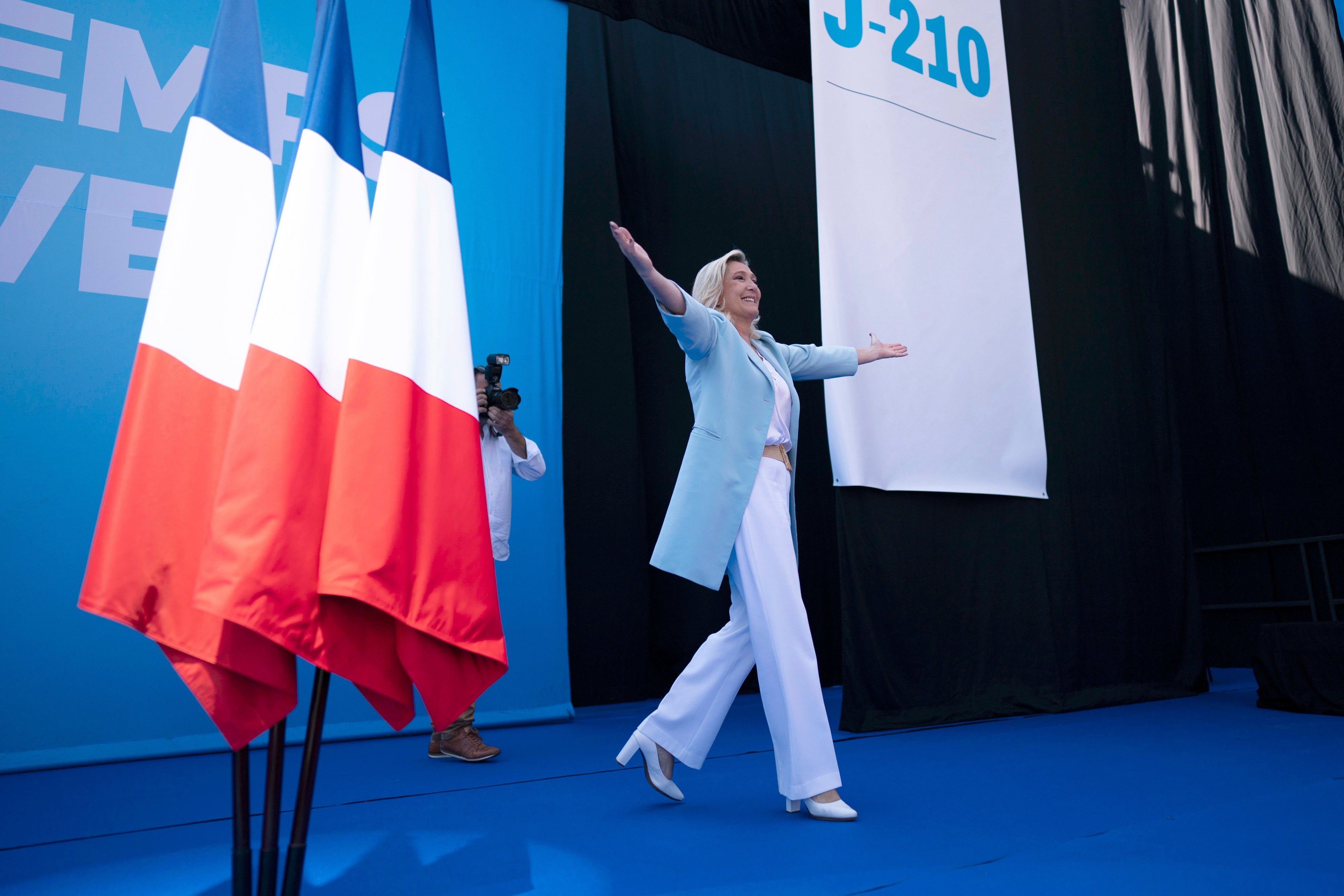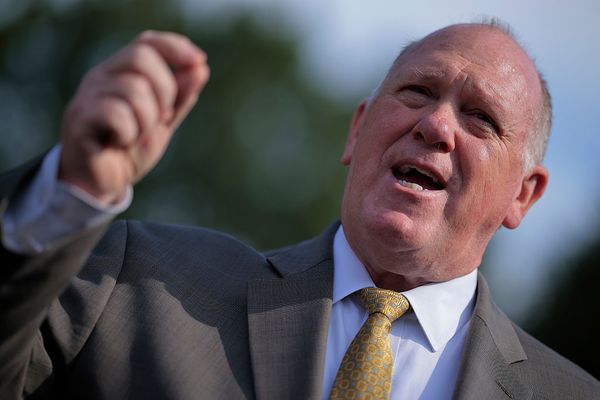
After coasting comfortably in the pole position of France’s presidential election contest, incumbent Emmanuel Macron now finds himself in deep trouble with just days to go before the first round of the vote, according to surveys and political analysts.
Mr Macron upended French politics five years ago by defeating the candidates of the mainstream centre-left and centre-right parties which had dominated the country for decades. But he is not generally liked by the electorate, and he may barely win re-election.
A Harris Interactive poll, conducted during the first days of April, showed him winning a hypothetical second-round match-up against far-right candidate Marine Le Pen with a razor-thin 51.5 per cent to 48.5 percent, within the poll’s margin of error.
An Ipsos-Sopra Steria poll conducted over the same days showed slightly better results, with Macron winning with 54 per cent, but still far less than his 66 per cent landslide over Ms Le Pen in 2017.
A Le Pen presidency would have a dramatic impact on global affairs. She is a staunch ally of Russian president Vladimir Putin and allegedly owes millions to Kremlin-influenced financial institutions that bankroll her campaigns.
She has vowed to pull France out of Nato and the American sphere of influence. She is a far-right populist who espouses racist and anti-immigrant views and is allied with former US president Donald Trump and Hungarian far-right prime minister Viktor Orban, who was re-elected on Sunday.
Political analyst Mujtaba Rahman of the Eurasia Group said a Le Pen presidency would pose an existential crisis for the European Union and Nato at a particularly crucial historical moment.
“It would fundamentally undermine the western alliance,” he says. “The EU would no longer be able to put up a coherent front against Russia in Ukraine. France would become a destructive partner within the EU, and that would have profound implications for the EU’s ability to function, and would fundamentally undermine the EU’s place in the world.”
Many have blamed Mr Macron’s weakening performance on a lacklustre campaign in which he has focused on playing elder statesmen in defusing the Ukraine crisis while refusing to debate other candidates or appear until recently on political talk shows. He held his first campaign rally on Sunday, just a week before the election.
“The war is not only overshadowing the political campaign but it has messed around with his campaign calendar,” said Georgina Wright, of the Montaigne Institute, a French think tank.
“The French take their presidential campaigns very seriously and there was a sense he wasn’t taking it very seriously. People feel when he has campaigned he has used those TV spots to talk as a president rather than as a campaigner.”
In contrast, other candidates have been barnstorming the nation and even visiting expatriate voters abroad for months, and boasting about it.
"I have been campaigning seriously,” Ms Le Pen, the 53-year-old daughter of French far-right maverick Jean-Marie Le Pen, said in a radio interview on Tuesday. “I’ve been in the field for six months ... others chose not to campaign, including the president of the Republic.”
Mr Macron, in a radio interview on Monday, attributed Ms Le Pen’s success to his failure to halt the rise of the far right. “I did not succeed in stemming it,” he said.
But others say the 44-year-old Mr Macron has simply been outflanked by the more politically experienced Ms Le Pen, who has toned down her party’s traditional obsession with Muslim immigration in what appears to be a successful attempt to soften her image. She has zeroed in instead on bread-and-butter economic issues of concern to lower and lower-middle class French families, such as rising fuel and heating costs.
“To be honest, this is more about Le Pen than Macron,” says Adele Stebach, a Lillie-based analyst and correspondent for Europe Elects, a news website that aggregates and assesses European election results and polling. “She benefits from very strong momentum after shifting her party’s focus from the issues of security and immigration to purchasing power, inflation and wages.”
Under France’s two-round political system, voters will head to the polls on Sunday to decide from among a dozen candidates, including leftists, right-wingers, ecologists, and agrarians. If, as widely expected, no candidate receives an outright majority, the two top contenders will compete in a 24 April run-off.
The 2022 campaign in general has generally been a dreary affair, revealing a crisis of inspiration and ideas within French politics. Politicians exhort ever less enthusiastic and cynical voters to vote for them. Streets are plastered with monotonous images of the candidates and empty slogans.
“The courage to do,” say the posters for centre-right candidate Valerie Pecresse.
“Another world is possible,” say the ads for left-wing candidate Jean-Luc Melenchon

“All of us,” say those of Macron.
Many of the ads have been defaced, but often in the same way, with the eyes of the candidates gouged out to give them the appearance of otherworldly ghouls.
Ms Wright suggested the agony of the Covid crisis was colouring the tone of the campaign season.
“The French are coming out of years of crisis after crisis,” she says. “Every candidate is promising a way out but rather than debating ideas they are campaigning in parallel.”
Mr Macron, a cosmopolitan pro-business centrist and former investment banker, appeared just weeks ago to be heading to an easy victory after putting on statesmanlike airs in the wake of the Ukraine crisis, in which he has sought to play a leading diplomatic role. But his polling numbers have steadily eroded since mid-March while those of both Ms Le Pen and Mr Melenchon, who is also focused on issues of economics and social justice, have surged.
Mr Macron has also come under fire for blowing more than €1bn on private consultants, including on the controversial American firm McKinsey, to help manage the Covid-19 pandemic. Mr Macron said there was nothing “murky” or illegal about the contracts, but they reinforce the sense that the president is an aloof elitist. “With me, consulting groups will be gone,” Mr Melenchon has said.
I think it will be very close and I even think Le Pen could win. If I had to bet, I would even say Le Pen will win
Ms Le Pen has also benefited from the candidacy of far-right extremist Eric Zemmour, whose inflammatory diatribes against immigrants and Muslims made her look relatively moderate. Over the last several years, even Mr Macron and his deputies have indulged in rhetoric demonising France’s Muslim minority, normalising such attitudes and allowing the views of Ms Le Pen and her party to infect mainstream discourse.
Though her stump speeches focus on economics, her National Rally party continues to demand an end to benefits for foreigners, a halt to family reunification of immigrants, and a ban on Islamic head coverings in public spaces.
“The far right is not scary any more for French voters,” said Ms Stebach. “Many people who didn’t consider voting for Le Pen previously now do. I think it will be very close and I even think Le Pen could win. If I had to bet, I would even say Le Pen will win.”







